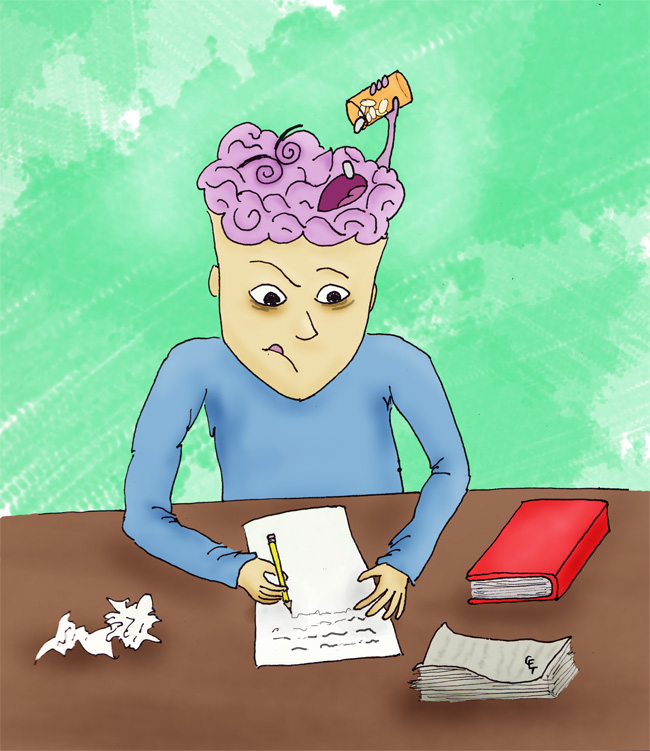From papers to midterms to group projects, university life is not a breeze. In addition to academics, students are being asked to perform what may seem like an overwhelming amount of extracurricular activities. It’s not a surprise so many students have to deal with a jam-packed schedule alongside the pressure of choosing their majors and their careers.
A common solution to dealing with the hurdles of school-related stress is caffeine. Bitter or sweet, caffeinated drinks are probably omnipresent in campuses across North America. However, what happens when caffeine is simply not enough for that late-night bout of essay writing? For many students today, the answer lies in study drugs.
Study drugs are prescribed to individuals dealing with disorders such as attention deficit hyperactivity disorder (ADHD) to help them focus and calm down. For those without a diagnosable attention disorder, these drugs, also known as “campus crack,” cause hyperactivity and what can be interpreted as productivity.
Alan DeSantis, a professor at the University of Kentucky, tracked the use of ADHD drugs at his university. He reported to CNN that, “[they are] abused more than marijuana, and [they are] easier to get.” According to his research, 80 per cent of the upperclassmen were users. Canadian universities follow a similar trend. The Globe and Mail reported in a recent article that more and more students across Canadian universities are taking them on a regular basis.
“I use Adderall especially during midterms and during finals,” said a third-year B.Sc McGill student. “I remember when I first took it: two papers done in a couple of hours when normally that would probably have taken me two weeks to do! But then, I had a friend who took it because she had a huge organic chemistry final the next day, and she told me it was just terrible for her. She couldn’t sleep for two days straight after taking it; so I guess it really depends on the person.”
Evidently, the effect of these drugs—just like most drugs—is individual-oriented. While these stimulants may seem like magic bullets for your GPA, the adverse effects of taking Ritalin, Adderall and Cancerta exist and are numerous.
When a student has a condition like ADHD, Adderall releases a combination of stimulants like amphetamine and dextroamphetamine that restore the balance of neurotransmitters to allow the user to focus. The dosage varies based on the medical condition of the patient. However, for un-prescribed students, this dosage is hardly regulated, and can cause serious side effects such as withdrawal reactions. These include changes in mood and in sleep patterns, as well as fatigue.
The U.S. federal government lists Adderall as a schedule II drug, meaning it is one with “the highest abuse potential and dependence profile of all drugs that have medical utility”.
According to the Director of the McGill Office for Science and Society Joe Schwartz, these drugs do allow for greater concentration, but he emphasizes, “[I am] not in favor of using drugs for that purpose.”
Aabha Sharma is a PhD candidate in Life Sciences at the Feinberg School of Medicine of Northwestern University in Chicago, with a particular interest in these ‘study drugs’ and their effects on society. Sharma says she has seen a fair share of her friends use these stimulants despite being knowledgeable of the risks involved.
“While it is important to control overuse of Adderall, especially in colleges, understanding why students are resorting to such dangerous prescription drug abuse is equally important,” Sharma said. “The world today is getting more competitive, and survival of […] the smartest is the reality which puts students [under] a lot of pressure. In order to cope with the high standards […] students are finding ways of staying focused to excel. My guess is that the colleges where Adderall overuse is becoming a big problem are also places where mental health issues are skyrocketing.”
According to the same article on the Globe and Mail, campus mental health professionals say they cannot police the use of study drugs and instead suggest educating students about time management, stress, and mental health.
“[A] healthy lifestyle will give you a healthy mind, and help you focus and excel in your work,” Sharma said. “Prescription drug-abuse might seem like it helps for the short term, but the long-term adverse effects might not be worth the price.”
It should be noted that taking or buying drugs without prescription is illegal. Beyond that, this debate of using drugs to forcibly improve cognitive function for better grades while harming one’s body should raise important questions into the values our society associates with the pathway to success. Is harming one’s body acceptable in the name of getting a 90?








